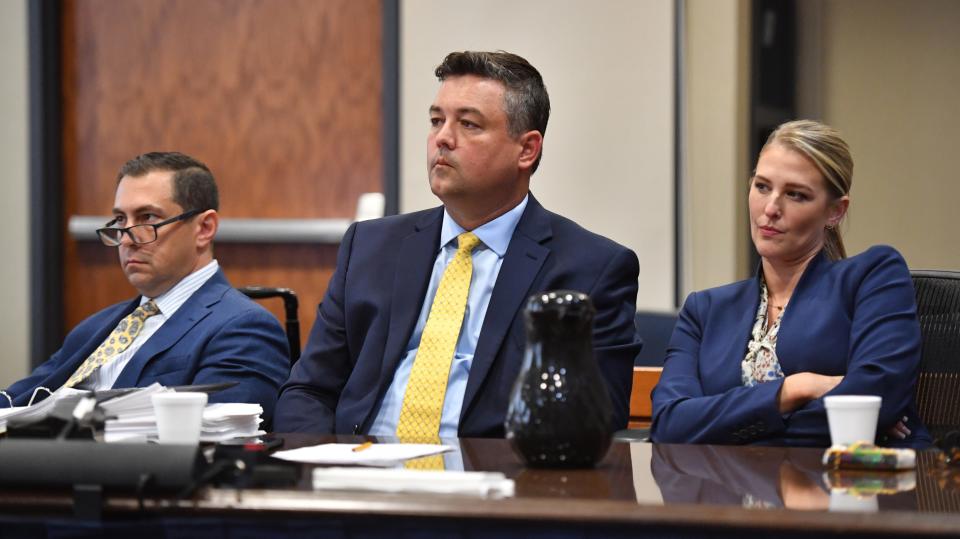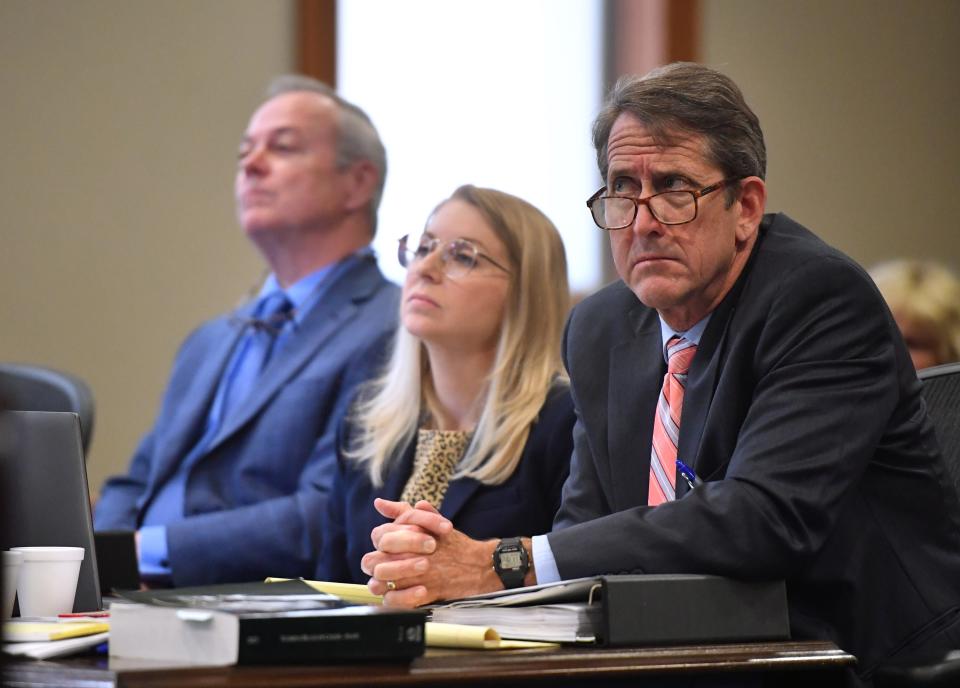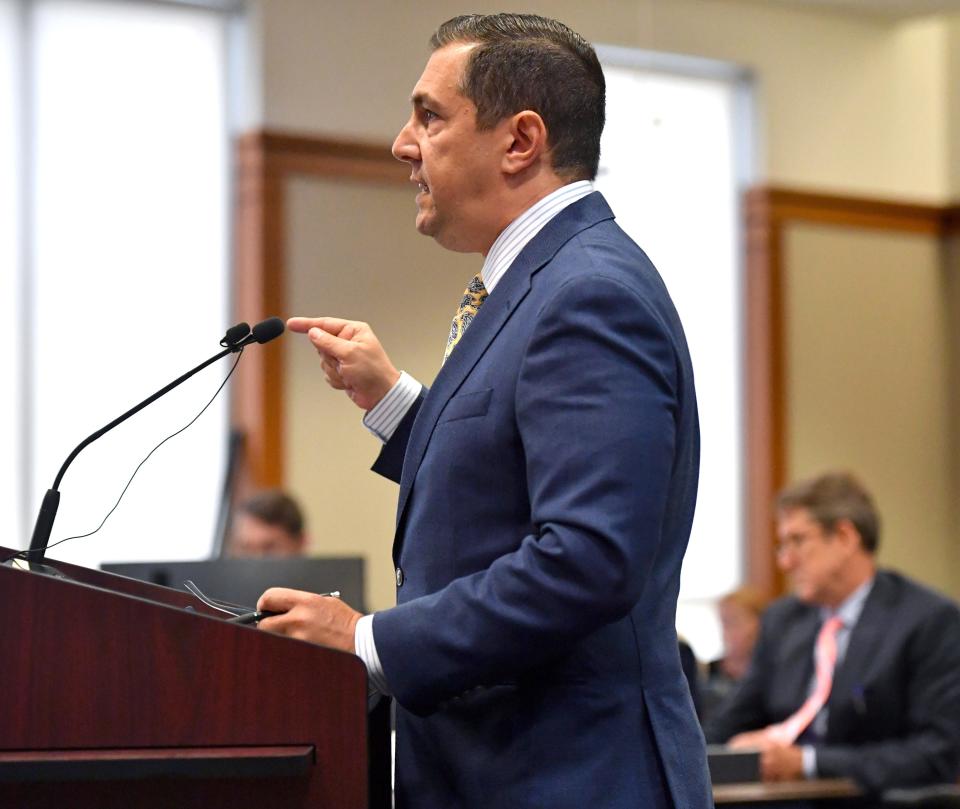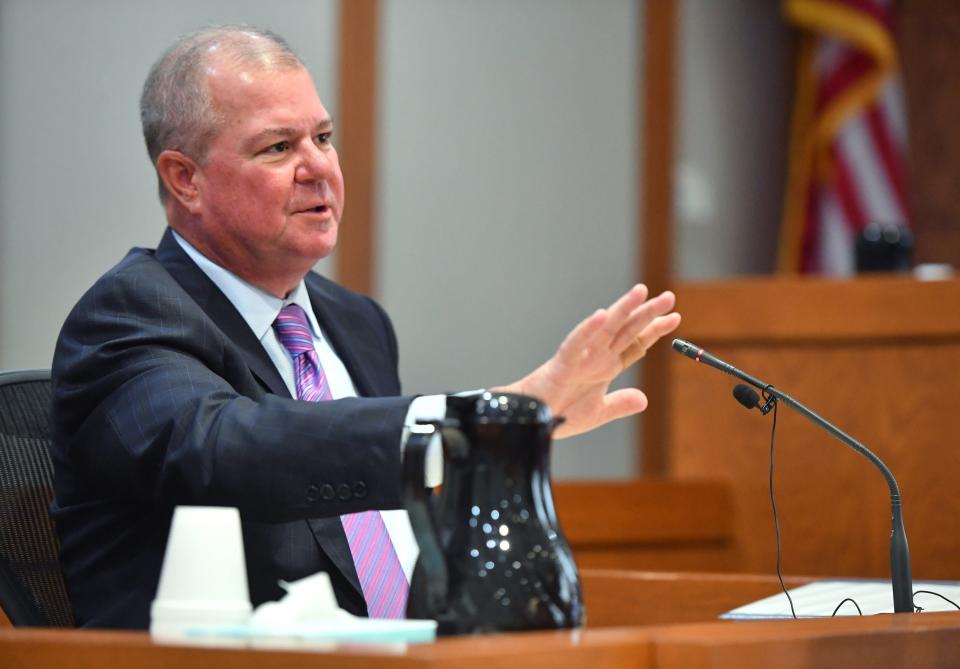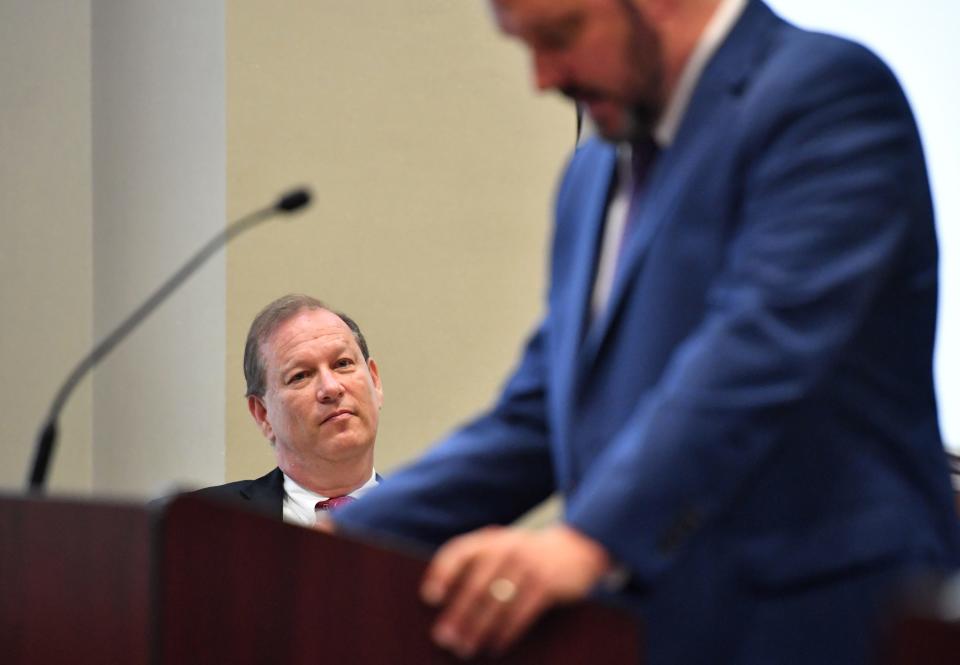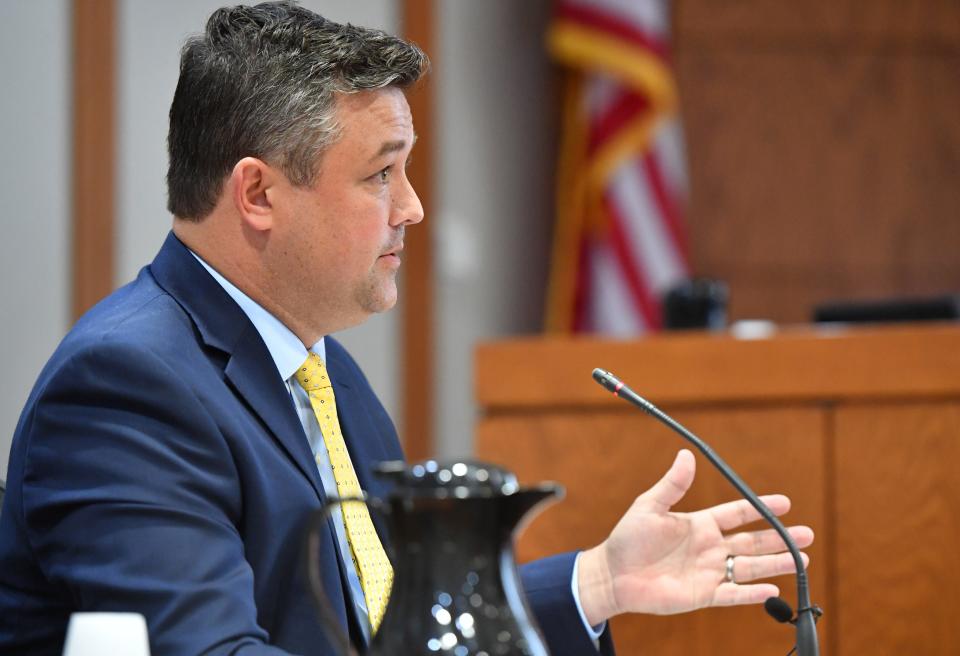Sarasota judge to decide about releasing Christian Ziegler's records
- Oops!Something went wrong.Please try again later.
- Oops!Something went wrong.Please try again later.
A Sarasota judge heard arguments Thursday regarding an injunction filed by former Florida Republican Party Chairman Christian Ziegler to stop the release of records obtained during a criminal investigation into sexual battery and video voyeurism.
Christian Ziegler and his wife and Sarasota County school board member Bridget Zielger appeared in court for the hearing, with Christian Ziegler taking the stand.
The Zieglers filed an injunction to protect records seized during an October investigation after Christian Ziegler was accused of rape by a woman he’d known for years. The allegation stemmed from a planned three-way sexual encounter between Christian Ziegler, the alleged victim and Bridget Ziegler who wasn't able to attend.
Sarasota police didn’t move forward with filing rape charges against Christian Ziegler, but asked the State Attorney's Office in January to review a related investigation into potential video voyeurism by Christian Ziegler. The SAO announced March 6 that it wouldn’t move forward with the charges.
Previous coverage: Sarasota judge denies motion to release ex-Florida GOP chair's seized criminal records
Keep reading: Zieglers sue to stop release of records from rape, voyeurism investigation
The lawsuit seeks to have all communications in the possession of authorities destroyed. Matthew Sarelson, attorney for the Zieglers, argued the release of the information would cause great humiliation and harm to his clients’ reputations and violate their privacy.
Sarasota Circuit Judge Hunter Carroll previously denied a motion to dismiss the injunction filed by Michael Barfield, The Florida Center for Government Accountability and a news media group including Gannett Co. Inc, the parent company of the Sarasota Herald-Tribune; The McClatchy Co. LLC; Nexstar Media Group Inc.; and Scripps Media Inc. Tegna Inc. and Times Publishing Co. would later join Barfield on the motion.
Attorneys argued the injunction went “overboard” and are asking Carroll to allow the release of records contained in the investigative file, including Christian Ziegler’s text messages, and his Google Drive and Instagram accounts.
Morgan Bentley, who represented The Florida Center for Government Accountability, said the case is unique in having such a powerful, high-profile couple centered around the issues stemming from the case. He added their request is much more limited than what people think.
Sarelson said during openings that while Christian Ziegler may have been a public figure since he was Chairman of the Florida GOP, he didn’t work for the government, so he was a private citizen when the allegation was made.
Carroll did not make a decision Thursday, but he promised to get a decision out as soon as possible. His decision is expected to come out in the following weeks.
Question of whether there was violation of Fourth Amendment
As the hearing shifted from opening to closing arguments, it appeared there was a question as to whether or not there were Fourth Amendment violations that occurred, both with obtaining a search warrant and the retention of evidence after the SAO declined to charge Christian Ziegler.
“The question for the court is, if a document is seized pursuant to a search warrant, does that alone make it a public record,” Sarelson said during closing arguments.
His stance is that it doesn’t. Sarelson asked Carroll to rule that anything obtained by a search warrant cannot be converted into a public record.
Questions also arose surrounding Fourth Amendment violations regarding how the initial search warrant was obtained from Circuit Court Judge Thomas Krug. Specifically, Carroll wanted to clarify if SPD detectives had told Krug in their probable cause affidavit for the warrant that Christian Ziegler's attorney had informed police there was potentially exculpatory evidence in the form of a video.
Questions for Sarasota Police Detective Angela Cox, the lead detective in the criminal investigation, focused on the timeline of when a search warrant was obtained for Christian Ziegler’s phone.
If the police knew about the video before asking for the search warrant and didn’t disclose it to the judge, there could be an issue that there wasn't probable cause for the search warrant.
Cox said that she hadn’t known that Derek Byrd, who represented Christian Ziegler, had reached out to SPD Sgt. Charles Riffe to tell him Christian Ziegler had a video that showed the sexual encounter had been consensual and they could view it at Byrd’s office. Cox believed they were going to meet Christian Ziegler and his attorney in the early hours of Nov. 2 for a statement, which was why they obtained the search warrant to collect Ziegler’s phone sometime between 10 p.m. and midnight on Nov. 1.
Riffe testified that he had every intention of taking the phone following that meeting, regardless of whether Byrd offered a copy of just the video because he didn't know what the video would show.
Chief Assistant State Attorney Craig Schaeffer, representing the State Attorney’s Office, said even if police had gone back to Krug, they'd still would have sought the search warrant and he added that the omission most likely wouldn't have changed the outcome.
In case you missed it: State Attorney's Office declines to charge Christian Ziegler with video voyeurism
More: Bridget Ziegler to ask School Board to reject new Title IX protections for gender identity
What are the contours of a public record and how do federal privacy rights?
The million-dollar question in the case looks at what the contours are of the public records act and whether or not federal constitutional privacy and property rights trump it.
Barfield pointed out Florida's Chapter 119 statute states that all records are open to the public. He added that Florida law also doesn't authorize the right to privacy to be elevated above the public's right to know.
Bentley argued that within the contours of public records, information found within the investigative file that was deemed relevant in the investigation or possible charges should be considered public records. He added if police copied something but decided it was irrelevant, it's not considered a public record.
Sarelson's argument is that federal privacy rights trump the public records laws and that there should be a complete return of his client's cell phone and data obtained pursuant to the search warrant.
Sarelson conceded that Florida's privacy amendment has "a carve out" for public records, but the U.S. Constitution doesn't. He added there is a much more developed sense of privacy in the U.S. Constitution.
Chief Assistant State Attorney raises concerns about scope of search warrants
Schaeffer pointed out the irony in his opening, stating that had Christian Ziegler been arrested, he could have applied for expungement. However, because no arrest was made, it isn’t an option.
In the same vein, had the case gone to court, then a motion to suppress certain evidence could have been filed and argued before a judge.
The current law leaves a “hole in the wall” for cases where individuals might be investigated, but not charged, and whether records obtained during the investigation then become public records.
Schaeffer voiced concern that the hearing could inherently impact the scope of search warrants, he said during opening, which could have a “massive chilling effect on law enforcement” because it would mean warrants would have to be very narrowly tailored.
The issue arises in that when law enforcement obtains an individual’s phone, digital forensic specialists often perform a complete download of the phone, which potentially allows them to recover deleted data.
A deposition transcription from SPD Forensic Digital Technician Brian Yang indicates that while targeted extractions are possible, it doesn't target potential deleted data, recovered data, databases or third-party applications.
Christian Ziegler takes the stand
Christian Ziegler took the stand following his former attorney, Derek Byrd, his eyes often darting towards his wife as he answered questions. Bridget Ziegler would shake her head at times as attorneys questioned her husband.
Questions posed by attorneys to Christian Ziegler focused on the criminal investigation, specifically his concern about the information becoming public knowledge and his Google searches after he initially spoke with police.
Ziegler testified he and Byrd didn’t take any action in court to limit the scope of the search of his phone, stating he didn’t know it was an option.
Gabriela Szymanowska covers the legal system for the Herald-Tribune in partnership with Report for America. You can support her work with a tax-deductible donation to Report for America. Contact Gabriela Szymanowska at gszymanowska@gannett.com, or on Twitter.
This article originally appeared on Sarasota Herald-Tribune: Judge to decide if Ziegler's seized criminal records are public
